How Green is My EV?
Posted on 9 March 2017 by David Kirtley
One of the largest sources of CO2 pollution from the average American consumer is the family car. The EPA states that 26% of greenhouse gas (GHG) emissions come from all forms of transportation (2014 figures). The largest source of GHG emissions, at 30%, is the electric power sector. However, just recently the Energy Information Administration (EIA) announced that transportation emissions have now surpassed those from electric power generation. Whatever the exact numbers, it's clear that if we want to reduce our GHG emissions we need to work to reduce them from these two sectors.
As individuals we can make choices which help decrease our electricity usage: LEDs over incandescent light bulbs, smart thermostats, etc. If we can afford it, and if we have the right house orientation, we can take an even bigger bite out of our CO2 emissions by installing solar PV panels to produce some or all of our electricity. But to get the biggest bang for our buck, perhaps the single best thing we can do to decrease our emissions is to switch from a normal car (internal combustion engine, or ICE, vehicle) to an all-electric vehicle (EV).
About two years ago my wife and I needed a second car and we decided to buy a 2013 Nissan Leaf. But because we live in Missouri, where most of the electric power is generated by coal, I was concerned that I would just be switching from ICE CO2 emissions to coal-electric emissions. Would we really be making any difference?
To answer that question (and others about how to compare MPG, fuel costs, etc. between a typical ICE and an EV) I kept track of data and made some calculations over a year-long period from September 2015 until August 2016. We bought the Leaf in June 2015 but it took me a few months to come up with a system and get a handle on what information I needed and where to find it.
Gasoline vs. Kilowatt-hours
We have a good grasp of what a gallon of gas means in terms of how much it costs and probably how many miles it will take us in our ICE cars. The "fuel" for an EV is kilowatt-hours (kWh) of electricity. Comprehending something as amorphous as a kWh stored in my Leaf's battery took a bit of a mental leap for me. The Leaf has a gauge on the instrument panel which displays the battery's amount of charge in 2 kWh increments, which isn't a very fine gauge. But the Leaf also records and uploads information on every trip made: kWh consumed, miles driven, etc. I can access this finer-detailed information from a Nissan website (figure 1). Now that I knew how many miles and how many kWh I used each month, I could look at my monthly electricity bills to see how much the EV "fuel" cost.
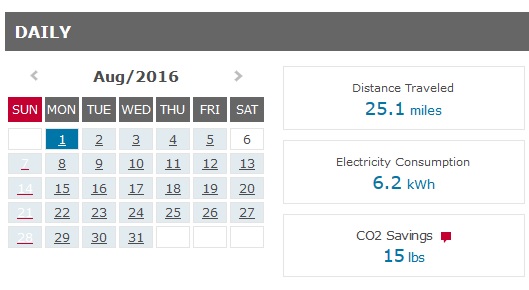
Figure 1. Portion of a screenshot of the Nissan Leaf website showing data for August 1, 2016. I travelled 25.1 miles and used 6.2 kWh. The "CO2 Savings" is not very accurate because it doesn't take into consideration the CO2 emissions from the electricity produced to power the car.
I also kept track of the average gasoline prices during each month and compared those to the electricity costs. Then I asked how would the Leaf compare to an ICE car traveling the same monthly miles. I used my ICE car, a 2009 Ford Escape Hybrid, to make this comparison. The average fuel-economy for the Escape over the year was 30 MPG (range of 28-32 MPG). Table 1 and Figure 2 shows this comparison. For fuel, the cost savings of the Leaf over an ICE vehicle averaged 53%, with a range of 43% to 57% throughout the year. The cumulative savings for the whole year was $287.
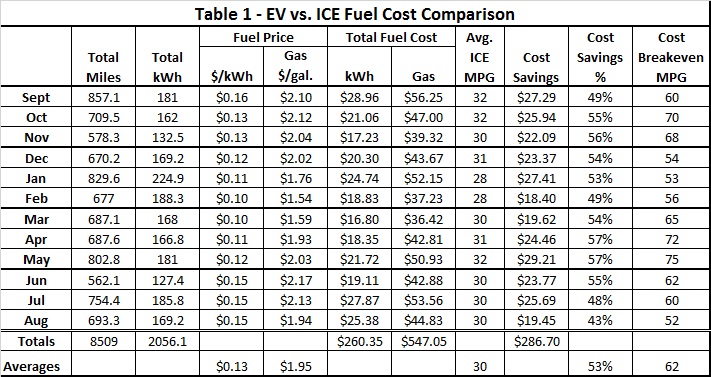
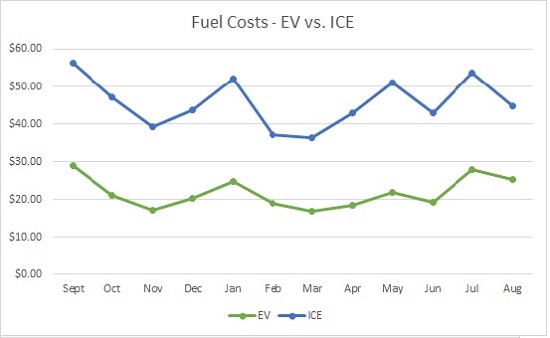
Figure 2. Monthly fuel costs for EV (kWh) and an ICE vehicle (gasoline) if driven the same miles as the EV.
In terms of fuel costs, another question was, what MPG would an ICE car need to have to "break-even" with the EV? I calculated this for each month and came up with a range of 52 to 75 MPG, and an average of 62. The only ICE cars on the market which come close to such good gas mileage are hybrid vehicles.
Avoiding CO2 Emissions
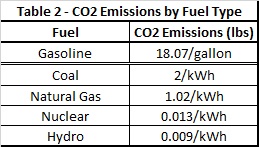 Now I needed to find out the amount of CO2 emissions from each fuel source: gasoline and kWh. Blueskymodel.org gives estimates for emissions from various fuel types (see Table 2). I also needed to find out the fuel mix used in Missouri for electric power generation, which I found in monthly reports from the EIA. Figure 3 below shows the fuel mix used by the larger electric utilities in Missouri throughout the year. Clearly, coal is still king in Missouri, followed by nuclear. However, there are some smaller utilities in Missouri which are beginning to introduce solar and wind to the mix.
Now I needed to find out the amount of CO2 emissions from each fuel source: gasoline and kWh. Blueskymodel.org gives estimates for emissions from various fuel types (see Table 2). I also needed to find out the fuel mix used in Missouri for electric power generation, which I found in monthly reports from the EIA. Figure 3 below shows the fuel mix used by the larger electric utilities in Missouri throughout the year. Clearly, coal is still king in Missouri, followed by nuclear. However, there are some smaller utilities in Missouri which are beginning to introduce solar and wind to the mix.
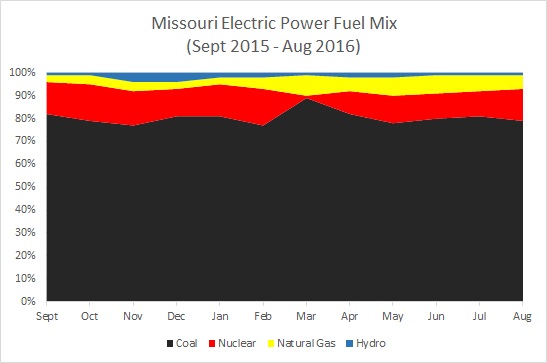
Figure 3. Fuel mix used by large electric utilities in Missouri, Sept. 2016-Aug. 2017. Coal accounted for an average of 80% of the total fuel mix, Nuclear: 12%, Natural Gas: 6%, and Hydroelectric: 2%.
Putting this info together I was able to calculate how many pounds of CO2 my EV was responsible for, and how that would compare to my ICE car. On average, by driving the Leaf, I was able to avoid emitting 137 pounds of CO2 each month, for an average improvement over my ICE car of 32%. For the whole year my avoided CO2 was 1644 pounds, or about ¾ of a metric ton of CO2. See Table 3 and figure 4 for more information.
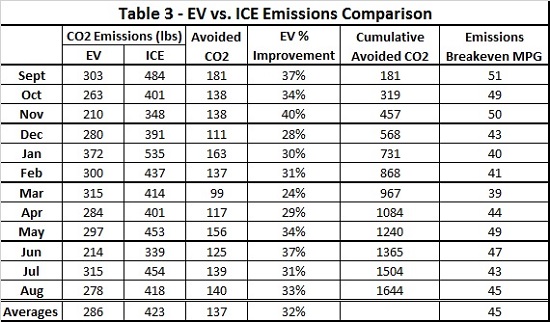
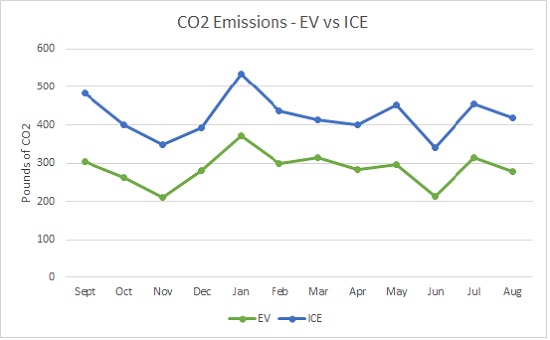
Figure 4. Monthly CO2 emissions for my EV and an ICE vehicle if driven the same miles as the EV.
Similar to the fuel cost break-even MPG, I also calculated an emissions break-even MPG for each month, in other words, what MPG would an ICE car need to have to break-even with the EV in terms of CO2 emissions. This worked out to a range of 39 to 51 MPG, and an average of 45 MPG. Not as good as the cost comparison but the EV still "emits" less CO2 than most cars on the road.
One Less Ton
Missouri has a long way to go to clean-up its electric power generation. But even in such a coal-dependent state, driving an electric car is still "better for the planet" than driving the normal gas car. By shifting to my Leaf I was able to avoid emitting ¾ of a ton of CO2 and I saved $287 on my fuel bill for one year. The extra money is nice, but I'm more concerned about drawing down CO2 emissions. To do that our societies need to switch how we generate power from fossil fuels to renewables. As individuals we can help make that switch by moving from ICE vehicles to EVs. Eventually the electric grid will catch up to us.































 Arguments
Arguments






























Time for you to get a solar PV system and a Tesla Powerwall installed on your home.
How about an article that reviews the carbon impact of building an EV compared to a regular gas or diesel vehicle to really determine whether it is truly green? That is something brought up a lot to discourage EVs And I don't know what the difference truly is.
Thanks
Mark @1 - Perhaps someday!
Boost @2 - I haven't had a chance to look through this report from the UCS: Cleaner Cars from Cradle to Grave, but their blog post about it says: "We found that battery electric cars generate half the emissions of the average comparable gasoline car, even when pollution from battery manufacturing is accounted for."
Interesting report David. According to the report, EV are 15% higher emissions to manufacture than corrosponding gasoline vehicle, but this is more than offset by the lower emissions over the lifetime of the vehicle.
Are there any spillover effects, where having a range-limited Leaf forces you to use the Escape when, if you had a small hybrid ICE vehicle instead of the Leaf, you would use the latter instead? I know there would be for my family, and it is a major reason that I have no interest in an EV at this time. We use our Prius for a lot of our long trips, which while few in number make up a disproportionate share of our miles driven. If we had to use our big vehicle instead, emissions would obviously go up, and I would guestimate by an amount comparable to any savings the Leaf has over the Prius.
Great to know that even in a jurisdiction where 80-90% of electrical generation comes from burning coal the EV wins, but remember - and be sure to point out - that the CO2 savings will be much higher where nuclear, hydroelectric and even natural gas account for a higher proportion of generation. For example, here in Ontario 61% comes from nuclear, 24% from hydro, 9% from nat gas & oil, 6% from wind, less than 1% from solar and biofuel, and a big fat zero from coal. Buying and operating an EV here will obviously keep much more CO2 out of the atmosphere.
Good analysis!
But... I've seen this often (almost always, actually) in EV comparisons. While you have a good start, you are missing something important.
Using a figure of 18 lbs of CO2 for gasoline only takes into account the final end product.
So basically this follows the electricity all the way back to the source, but then assumes that gasoline magically flows from the ground, fully refined, right at the local filling station. In reality there are CO2 emissions from the drilling, pumping, transport, and refining. To be really fair, even natural gas flaring, (burning off the un-wanted by-product of oil extraction) and oil spills should be accounted for.
Those emissions are not well documented, so they are difficult to include, but they are real. For instance, refining using about 3 KWh of electic power per gallon of gasoline, which would power the EV about 10 miles. If the oil came from tar sands then that figure is double or triple. If the electric power for the EV came from coal, you can also assume that the power for the refinery also came from coal.
Per BBHY@7, one source I found has a DOE estimate that 6 kWhr of power is lost in refining one gallon of gasoline. If from coal, that's 12 lbs of CO2. Add in transportation and storage, and its likely the 18 lb CO2/gal used above should be doubled, to 36 lbs CO2/gal of gasoline. In the pilot episode for Robert Llewelyn's TV series on EV vehicles, "Fully Charged" he made the same claim (that actual CO2 from gasoline is more than twice the CO2 from combustion alone. Comparison at 6.5' into this episode).
Ogemaniac @5 - YMMV (heh!). The Leaf's range is about 80-100 miles on a full charge so that is a bit limiting, but it depends on one's needs. We live in St Louis, MO, a smallish, big-city where most everything is close-by. My commute is 12.5 miles one-way, my wife's is about 10 miles one-way (although she often has to drive around to meetings on some days). So the Leaf is a perfect vehicle for about 90-95% of our needs.
Jim @6 - Yes, in areas powered by fewer fossil fuels EVs would have an even smaller carbon footprint than mine. Which is why I thought my situation would make a good "test-case" to see if EVs are worth it. You have NO coal in your energy mix?! Amazing!
BBHY and ubrew @ 7 & 8 - I hadn't considered that there may be even more emissions involved in gasoline production. But, I wanted to be as "generous" to the ICE condition of my comparison as possible...I didn't want to be accused of tipping the scale towards my EV. ;)
This is a very nicely done and important article, thank's for doing all this work.
I did not see a compensation for electrical transmission costs. Perhaps there is a mechanism in there to allow for it, which did not register with me. If not, this is an important part of the function. You would have to devide your electrical outcome by the delivery function. If line losses are say 20%, then your 286 must be devided by 0.8 giving you 357 CO2 emission lbs. That's still better than ICE, but not a viable solution for the planet, where another 75% of 9 billion people can drive cars.
We kid ourselves a lot about how the automotive urban structure is workable. It is luxurious, but it is not viable. I still feel the best solution for CO2, and overall environmental load on the planet per person, is to redesign urban profiles so as to reduce auto miles. That's a much harder thing to achieve, but that's where we should be aiming.
PluviAl at 11: That is spelled "Carbon Tax, or Tariff" and a much harder sell, but it needs to happen.
Another thing that is missing from this analysis is the depreciation costs on EVs compared to those on ICEs. Based on my own research in looking for an EV or Hybrid, the EVs have drammatically higher depreciation costs (except for Tesla, but who can afford those anyway). I would really like to purchase an EV for the fuel cost savings and emission reductions , but on my budget I cannot afford it, considering how badly I would get hurt on the depreciation. A comparison of the depreciation costs of EV vs Hybrid vs ICE would be great.
Here are my comments on the issue:
http://scienceblogs.com/gregladen/2017/03/10/should-you-buy-an-electric-car-if-you-live-in-a-coal-state/
Pluvial, I think the answer to your question is actualy very simple: Electric motors are a gazillion times more efficient than combustion based motors.
Regarding depreciation: That is pretty much a hippie-punching arguments. EVs have no known depreciation function. They are a new technology, and the market hasn't come close to making up its mind.
Nomorewoo @13,
You need to provide some proof of dramatic depreciation os electric vehicles.
However if you are right, it could be due to a couple of things. Firstly uncertainty about electric cars, and how they perform when old. This is foolish, as electric motors are very durable and also easy enough to replace. Secondly it could be worries about how much life is left in the battery.
The maths on the exact carbon content going into making electric vehicles etc etc, and how they compare with petrol will always be hard to analyse exactly. However a couple of things are obvious to me about electric cars:
1. Electric motors are more efficient than petrol by a big margin, and so are cheaper to run.
2. Emissions are definitely significantly lower. I'm not going to agonise over exactly how much.
3. Electric motors also tend to be very reliable and quiet.
This is enough to convince me of the merits of electric cars.
For the sake of the argument, let's assume, as stated above that EV's are responsible for more carbon emissions into the atmosphere in their manufacture. This is only so if the source of the power to run the factories is from coal fired powere stations. If the factroies have their own solar power (Tesla for instance) or if the grid transfers over to renewable generation then this disadvantage falls away.
David, yes, Ontario now generates zero of its electricity from coal. The last coal fired generating plants in the Province (Naticoke and Thunder Bay) were closed in 2013 and 2014, and several new peaking power gas plants eliminated the import of coal generated power from the US Midwest during seasonal periods of peak demand (e.g. summer air conditioning season). Quebec, British Columbia and most of the smaller provinces also produce zero from coal power, but Alberta stil burns coal and a few provinces burn oil. Combined it means well over 63% of Canada’s population is able to make very robust CO2 reductions by using EVs.
"I... calculated an emissions break-even... what MPG would an ICE car need to... break-even with the EV in... CO2... This worked out to...45 MPG"
This scales directly with the assumed lbs CO2 released per gallon of gasoline burned. Per my comment (ubrew12@8), that may actually be closer to 36 lbs CO2/gal than the 18 lbs CO2/gal you used, due to refining, transportation, and other costs. In that case, a 'break-even vehicle' would have to get closer to 90 mpg to match the performance of your EV. I dare say such a vehicle is not to be found, not even in advanced hybrid vehicles. 90 mpg is twice what most motorcycles are getting.
"my avoided CO2 was 1644 pounds, or about ¾ of a metric ton of CO2." You can be prouder than that. I calculate 6681 lbs CO2 avoided, or 3 metric tons annually.
nigelj @15: I think nomorewoo is talking about battery life. I have read 5-10 years, or ~100,000 mile lifespan. At a cost of $10k to replace them (LINK), this is an important point in terms of determining the true net life-time CO2 emission differences.
Similar to Dave's study, I did a similar but "theoritical" analysis based on my state's Indiana power. IN's power fuel mix has an even higher lbsCO2/kwh footprint than MO. I came up with the following theortical results.
EV: 3.2 lbsCO2/kwh (power delivered to the wheels). Based on 1) 62% EV "grid-to-wheels" efficiency for grid+batteries+motor inefficiencies (link). And, 2) for the CO2/kwh factor, I derived the weighted avg IN power to be 1.85 lbsCO2/kwh (based on 77% coal (2.1), 19% gas (1.22), 4% non-carbon (zero); sources: IN fuel %split #'s & CO2 by fuel type). Then, 3) I applied a mine-to-PP for coal (or well-to-PP for gas) extraction/refinement scale-up factor of 1.09 (I assumed the same # for both coal & gas) which increased this 1.85 to 2.01 lbsCO2/kwh (exactly the same # as Dave has here but I clarify that this is for IN power & does include what I think is appropriate factor for the coal&gas extraction+refinement CO2 scale-up factor). Source for this 1.09 "extraction+refinement" scale-up factor is HERE (math=1205/(1205-100)). ... Final complete math: (2.01lbsCO2/kwh)/(61%grid-to-wheel eff) = 3.2 lbsCO2/kwh (to wheels)
ICE: Range of values depending on ICE eff: 3.5 lbsCO2/kwh to 4.4 lbsCO2/kwh (power delivered at the wheels). Based on 1) ICE "petro-to-wheels" efficiency varies from 17% to 21% (link). And, 2) based on 19.0 lbsCO2/petro-gal w/10%Eth (link). Then, 3) I applied a well-to-station extraction+refinement scale-up factor of 1.28 which increased this 19.0 to 24.4 lbsCO2/gal (which is a bit more than Dave used here but I clarify that this does include what I think is appropriate factor for petro extraction+refinement CO2 scale-up factor). Source for this 1.28 "extraction+refinement" scale-up factor is HERE (math=(95/74)). ... Final complete math: (24.4lbsCO2/gal)/(range: 17%-21% petro-to-wheel eff)/(112000btu/petro-gal)*3412(btu/kwh) = 3.5 to 4.4 lbsCO2/kwh (to wheels)
Dave's real-life study resulted in EV/ICE CO2 ratio of 0.68. I calculate the range of EV/ICE CO2 ratios to be 0.74 to 0.92 depending on the fuel efficiency of the ICE. The ICE efficiency site that I used (here) does not correlate its ICE eff #'s w/ mileage #'s so it is hard to correlate Dave's 30mpg to the petro-wheel %eff #. However, I would expect that Dave's 30 mpg hybrid to be on the high-end of what this site would consider available ICE efficiencies (i.e. therefore closer to 21% eff), thus I would have expected an EV/ICE-hybrid CO2 ratio to be closer to 0.92.
My calculations are all theoretical; Dave's are real life. One thought for possible real-life study issues: 1) It would have been ideal if the Leaf's power consumption was truly metered and not based on Nissan "book" numbers. Lastly, 2) Was the hybrid's driving "route & style", in determining its average ~30mpg factor, similar in terms of power duty compared to the driving "route & style" of the Leaf? I assume the car weights are similar, but what about avg speed & hill differences? Was the load duty on the hybrid possibly "worse" than the Leaf's?
Jim Eager's point (@6) is right in. Same logic would apply to WA state residents, where the weighted avg mix for its power is only 0.47 lbsCO2/kwh (vs 2.01 in IN). So, in WA the EV's would only emit 0.76 lbsCO2/kwh (power delivered at the wheels). Resulting in an EV/ICE CO2 ratio of only 0.17! This would result in ~$256 monthly savings if a $100/UStonCO2 tax was applied to all FF carbon, making it very attractive for everyone in WA to switch to EV's.
------------------------
It's too bad that net comparison calculations like this are so difficult. This difficulty is only because energy cost does not include the external cost of CO2 emissions. If it did (at a rate that is equal or more than the external cost of CC impacts), then this net comparison calculation would be plainly transparent to us (& directly to our pocket books). And, all the difficulty to figuring the assorted costs here (including coal extraction, petro refining, the 17%-21% ICE efficiency factor (LINK), the 62% EV efficiency factor (LINK), the 40% efficiency of the typical power plant rankine cycle, battery life cycle, etc, etc). All of those net calculation complications would be transparent & real making it plainly obvious to our personal & industrial balance sheets as to what is the right choice (and, most convincing, the profitable choice). If only energy costs included CO2 external cost ...
Micro pursuits like this are important to us individually, but macro pursuits (i.e. changing energy policy) are more important because it is these that will make for truly substantial carbon emission reductions. A plug here to promote enacting Carbon Fee & Dividend (especially the least burdensome revenue neutral flavor, i.e. as advocated by Citizens' Climate Lobby) and then serious carbon emission reductions will start to happen. If energy is priced sustainably positive, then the right technologies will take off because they will become the profitable ones. Consider joining your local CCL chapter!
We bought a second hand Leaf just over a year ago and, since we live in the UK where fuel costs are much higher (currently around £1.18/litre or around £5.40/gallon) the savings are much greater. Assuming that all the extra electricity we have used over the past 12 months is due to recharging the car, we've saved over £1,200 compared to the previous year when we had our ICE.
As we're with a 100% renewable energy supplier, our only direct fossil fuel use is the natural gas we use for heating and cooking. That was around 9000 kWh last year, which gives annual CO2 emissions of around 1.7 tonnes of CO2. That's for a family of four.
From our experience, I'd say that massively increasing the renewable energy generating capacity and moving to EVs will go a long way to reducing CO2 emissions to the level that we need to. It will also have other benefits such as cleaner air in towns and cities and less noise.
There are still a few annoyances though. The range can be a pain sometimes but I expect the next generation of EVs to have a much greater range. Also, we need more recharging points, especially where we live!
There are no insurmountable problems to reducing CO2 emissions; what is lacking is leadership in tackling the issue.
Robert Llewellyn (Red Dwarf) has a good Youtube channel that covers EVs and renewable energy:
https://www.youtube.com/user/fullychargedshow
He used to drive a Nissan Leaf, but now has a Tesla.
Lets not forget electric bikes which have had a much greater rate of success than cars. Pensioners and other 'reluctant' cyclists now use electric cycles to get to work.
On the issue of electric motor vehicles the positives out weigh the negatives and there is a much bigger issue in general regarding the electrification of the energy system. This enables all sorts of advances in technology. Electric motive power is generally revolutionising many areas of transport and technology. This includes use of electric drive in ships and the beginnings of electric flight.
If you also factor in superconducting motors and generators, sodium-ion battery developments and numerous other ongoing advances, then the negativity regarding renewables and EVs is larger misplaced due to lack of knowledge or ignoprance.
EV positives:
1. Energy used to move the vehicles is low carbon and this energy represents the greatest carbon footprint over the vehicles life time. The issue of manufacturing emissions is one that is both insignificant and resolvable through evolving improvements.
2. Particulate pollution is reduced. Diesel emissions are a growing problem and EVs are the only solution that tackles both carbon and particulate emissions.
3. EVs accelerate very quickly which is a selling point. They do so because the energy transfer is very efficient.
4. They are very reliable, this is important since modern cars are almost impossible to maintain for the average person, so less trips to a car servicing garage, the better.
5. The batteries last longer than the cars themselves and can be used in the second hand energy market (grid balancing, smoothing).
There is a bigger picture out there and its electric.
Another issue which sometimes comes up as an "argument" against EVs is that us hippies are not paying our fair share of fuel taxes which go towards roads, etc. David Robert's had a recent post on this: Buying an electric vehicle? A growing list of states will charge you extra yearly fees.
Here in Missouri we already have a "yearly fee" of $75.00. But I wondered if that amount really covers my "fair share" and offsets what I would normally pay in fuel taxes at the gas pump, so I made another table:
For each month, the number of gaIlons is the amount I avoided using by driving the EV instead of the ICE car. It looks like Missouri is getting $26 more from me because of the EV. And the Feds are out $52.
I don't really mind paying $75 for the sticker each year, but I think there is probably a better solution(s) for collecting "taxes" to pay for roads. Especially since the Feds are left holding the bag in Missouri.
Isn't it nothing more than patting one's self on the back and saying "I'm good" for generating less CO2 instead of none? You could always use a fuel cell vehicle which generates zero CO2. So those of you that have the EVs are far off track.
[RH] Unsupported claim.
sauer - good analysis but I didn't see where you were correcting for the fact that most traffic is on Freeways and that EV's are at a distinct disadvantage there having to have the pedal to the floor all the time and hence running at near maximum while ICE (even Prius) are operating in their most fuel effective regions. So I would assume your ratios to be a lot closer to the 92% region.
Another point - lithium is not a common material and the mines from which litium are extracted are hardly environmentally friendly with tons of ore required to obtain ounces of purified lithium.
It seems to be that the EV craze could be supported in large cities with traffic problems, but it is far less supportable in more open country.
[RH] Please at least attempt to look up information before making statements here. This is the 21st century and you have the internet at your fingertips. IC engines do not approach 90% efficiency because so much of the energy being produced is heat rather than kinetic. That's why your ICEV has a cooling system.
Patience is running very thin here.
Wake,
According to Consumer reports, the eight cars that have the best (by far) highway milage are all electric cars. Electric cars have double or triple the milage of IC engines. Only the first 6 local cars are electric. I did not bother to see why there was a difference. No-one is surprised to see Wake fail again. As the moderator points out, IC engines are only 25-30% efficient compaareed to 80-90% for electric. Apparently the best engines can reach 35% on the highway. When they are stopped at a light they are 0% efficient while electric engines use no power.
Electric cars have the highest acceleration of any cars on the market and go as fast as the designers wish. In 2007 Al Gore's son was ticketed in California driving a Prius over 100 miles per hour. All electric cars go very fast since they are designed to be aerodynamic. The Hummer is the slowest car on the road.
Lithium is produced by extracting salty water containing lithium, primarily around dry lakes, and evaporating the brine to obtain the lithium. Your claim of tons of ore appears to be related to gold.
Wake might have been refering to a story debunked by Snopes: www.snopes.com/lithium-mine-oil-sands/
Regarding Wake comment.
Fuel cell vehicles use hydrogen, which is an energy carrier, not an energy source. In that respect fuel cells serve the same purpose as batteries, they enable energy storage and transport of energy.
There is also the issue of the production of hydrogen. One day if/when nuclear fusion becomes a practical reality and hydrogen can be produced efficiently with minimum of energy losses. Hydrogen will be more practical.
In any case Na-ion batteries look as if they could be realistic replacements for Li-ion batteries.
http://cen.acs.org/articles/95/web/2017/02/solid-new-approach-sodium-batteries.html
http://www.faradion.co.uk/technology/sodium-ion-technology/
https://www.acs.org/content/acs/en/pressroom/presspacs/2017/acs-presspac-february-15-2017/making-sodium-ion-batteries-that-last.html
Wake, @24: Thank you for taking the time to read my post. You have some good points. I am very happy to dialog with you on two minor details related to your post.
ONE: I am confident that you understand that my calculated 0.92 is not ICE efficiency (as the other posts assumed). I say this because you are referring to my post where the 0.92 is the calculated ratio of EV/ICE CO2 emissions when comparing the numerator EV's lbCO2/kwh (powered from Indiana power, 77%coal + 19%gas) to the denominator ICE's lbCO2/kwh (with the ICE having a engine-to-wheel efficiency of 21%, which is on the high-end ICE efficiency, see my post above for all the sundry references and the full blown math details). And, just to reiterate my numbers from above and clarify here: This EV/ICE CO2 emission ratio drops to 0.74 at the low-end ICE efficiency of 17% (see same reference). And, that Dave's (this article's author) EV/ICE CO2 ratio was 0.68. ... My worksheet calcuations can be found & downloaded from my google drive public folder HERE; see file name: 'Energy Cost Impact w-CO2 Fee_Rev1.xlsx'
Back to your note, and my response to it: I understand that you were simply saying that EV's probably don't operate as efficient (as per my reference EV efficiency of 62%) if you averaged the EV's efficiency over the whole gambit of operating conditions (city & highway), especially at higher-load highway driving. And, because of that, you felt that this EV/ICE CO2 generation ratio would be higher (up closer to my 0.92 calculated value) at these higher-load conditions. On this point, I would ask you to consider the following:
1) Power-is-Power: My calculations simply boil down to one thing only, and that is putting equal amount of "power to the wheels". It really doesn't matter if the car contains an ICE or an EV motor; power is power. And, that is all my CO2 ratio calculations care about.
2) Is the Leaf efficient simply because it is wimpier than the Escape?: You could be asking this valid question. This is a question that we could easily put to the test. Dave might be willing to answer the following question: What is the max speed of the Leaf (on level ground, w/ no wind)? And, how does this compare to the same for the Escape? If the two are comparable (say in the 90-100mph range), then I would say that this answer settles that the Leaf's high efficiency is not simply because it is wimpier than the Escape.
3) EV efficiency versus speed: Then you might think: But at those higher loads, the EV efficiency probably drops way off compared to the efficiency of the ICE. But, based on a quick google search, I don't think this is the case: results HERE (EV chart) and HERE (ICE, see chart at the end of section 4.1). It appears that the EV efficiency profile (vs speed) is near its peak thru-out most of its operating range, and the ICE efficiency profile (vs speed) certainly isn't any better (I think it is worse at speeds outside of its "sweet spot").
Does this information help settle that EV may, in fact, be equally efficient at the high-end (highway and hills) driving conditions???
Side clarification point: The EV chart above says that top end EV motor efficiency is ~92%. This is true for the motor itself, but when you include the inefficiency of the batteries (for example, the heat emitted from them), then the overall efficiency of the EV is lower (~62%) as per the reference I gave in my original comment. Although, back to Dave's study, the true EV efficiency value may well be higher than the abover reference 62%.
TWO: On your point about the net CO2 from lithium battery production: I have no idea how CO2 intensive lithium capture and battery production is. But, bottom-line, I don't care. Essentially, I'm defusing this lithium discussion by stepping back and looking at the forest instead of the trees. And, I would hope to appeal to your clinical, fiscally conservative moral sensitivies on this point (which we both have common ground on). ... This being: If a carbon fee was applied to carbon-based fuels (at their source) equal to the amount of future CC damage costs (at least ~$100/imperial ton CO2), then the CO2 intensity of everything would be fully transparent and we'd let impersonal economics answer what is the least CO2 intense way to move a 2000lb box of steel down the road.
And, to my greater point, the sooner we install said carbon fee & dividend policy, the sooner we apply non-bias forces (of the cost-vs-profit balance sheet) that will impersonaly settle what is the best technology of everything we do (including transportation). And, that the more important fight on settling these sorts of micro-details, and getting our economy re-tooled toward the best sustainable technologies, is to put most of our personal energy into building political-will to pass RNCFD (revenue-neutral carbon feed & dividend), as propsed by Citizens' Climate Lobby. So, my point here is, I don't care what the detailed nuanced truth is behind the CO2 generated to make lithium batteries, but if RNCFD and a $100/tonCO2 tax was applied, then we'd quickly find out what the truth is in an impersonal, transparent and fiscally responsible manner. And, if lithium batteries do have lower CO2 intensity than all other technologies, then the economy would be "all-over-them", because they would be the most profitable way to go.
So, I choose not to haggle over details that make us go around & around, and go nowhere year after year. I simply step back and say, what we are doing is wrong. We are polluting carbon and that has, and will increasingly cause, significant environmental costs to the future. And, the best way to re-tool what we are doing is put those future costs into our energy profile prices. And using the efficient RNCFD model (the least economic burdensome proposed mitigation policy available) will achieve this worthy goal. Don't worry about settling arguments that fixate on this tree or that tree, step back and deal with the whole forest in one shot.
Does this type of straight-forward, bottom-line (profit-vs-cost) lanuage speak to you on settling the truth behind these sorts of micro-technological details??? I would be overjoyed if you started to see a glimmer of logic with this sort of approach (RNCFD) on how best to transition ourselves to a fiscally responsible economy. ... If so, please consider sitting in on meetings at your local CCL chapter and hearing what they have to say??? You will be amazed at how logical and civil/respectful this organization is! ... Regards!
greg_laden@ 14
"EVs have no known depreciation function." This is nonsense, any mechanical technology has some sort of depreciation as all machine experience wear and tear.
:the market hasn't come close to making up its mind." This is also nonsense; the market is making up its mind every minute of everyday. Type in 'used electric vehicle for sale' into google and you will find what the market has decided the market depreciation on a EV is in your area at that moment.
nigelj@15
The only thing i "need" to do is breath, but here you go anyway
https://cleantechnica.com/2016/08/14/stunning-deals-used-electric-cars-expense-1st-owners/
I am making the suggestion that an article investigating the depreciation costs of EVs vs ICEs would be great.
[PS] Fixed link